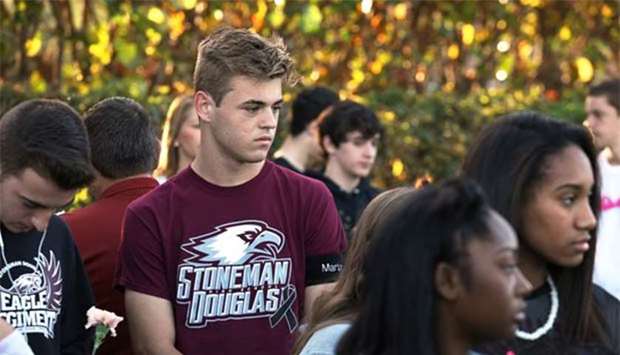Families of the teen survivors of the second-deadliest shooting at a US public school gathered outside Marjory Stoneman Douglas High School on Wednesday to support the students returning to the place 17 people were massacred two weeks ago.
About 3,000 students, many carrying white flowers, wove through hundreds of uniformed police officers to get to class. The school district was easing them back into their routine with a half-day of classes scheduled to begin with what is normally the students' fourth period. That was where the students were in their day when a 19-year-old man who had been kicked out of the school is accused of beginning his rampage.
Not all of the sprawling school was reopened. The building where the 14 students and three educators were fatally shot on February 14 will remain closed, officials said, as state lawmakers contemplate tearing it down and replacing it with a memorial to the victims.
Jeannine Gittens, 44, and Nia Hills, 47, drove to Douglas ahead of the bus their sons rode in to be there for their arrival.
"We just wanted to make sure they know we are there and that they have our support," said Gittens, who said her son Jevon, a 16-year-old junior, and his friend had ridden the bus "to make today feel as normal as possible."
The shooting inflamed the nation's long-running debate on gun rights as defined in the Second Amendment of the US Constitution. It also sparked a youth-led gun control movement featuring survivors of the attack in Parkland, Florida, who have already lobbied lawmakers in Florida's capital Tallahassee and Washington, DC.
"We will push for change and our children are going to be the change agents," Gittens said. "We see that things have to change and we are not going to stop until they do."
Freshman Nicholas Rodrigues, 15, said he decided to walk the mile (1.6 km) from his home in neighbouring Coral Springs rather than ride his bicycle as usual because "wanted to think about things."
Even as students went into the sprawling Douglas campus, supporters remained gathered outside.
"We feel for these kids so much," said Beverly Turner, a 63-year-old youth pastor, who said she had two children who graduated from the school. "We've seen them grow up and us being there for them is the least we can do."
Investigators have accused 19-year-old Nikolas Cruz, of carrying out his attack with a legally purchased AR-15 assault-style rifle.
The debate over how to respond to the school shootings pulled in corporate America, with gun retailer Dick's Sporting Goods Inc on Wednesday saying it would no longer sell assault-style rifles, the type of weapon used in four of the five deadliest mass shootings by a single gunman in US history, as well as Parkland.
Eyes on Washington
The Republican leaders of the US Congress on Tuesday rejected new limits on guns after the attack, saying they would not raise the minimum age to buy guns. The powerful National Rifle Association lobbied forcefully against any restrictions on gun sales, saying they infringe on the rights of law-abiding citizens.
President Donald Trump has suggested arming teachers and reopening mental hospitals as a way of combating school violence. Trump is scheduled to meet with a group of 17 senators and representatives from both parties later on Wednesday for a discussion on background checks and other proposals later on Wednesday, the White House said.
Following the shooting, several large American companies said they were ending programs that offered discounts or other benefits to NRA members. Some have faced blowback, particularly in Georgia where a lawmaker said he would try to stop lucrative tax benefits for Atlanta-based Delta Air Lines after it cut ties with the group.
Sporting goods retailer Dick's said it was banning sales of guns at its stores to anyone under 21 and no longer selling high-capacity ammunition magazines.
"We have to help solve the problem that's in front of us," the company's chief executive, Edward Stack, said in a statement. "Gun violence is an epidemic that's taking the lives of too many people."
Dick's had removed assault-style weapons from its stores after the 2012 massacre of 26 children and educators at Sandy Hook Elementary School in Newtown, Connecticut, but later brought them back.
Cruz was 18 when he bought the gun he is accused of using to attack the school. A Florida court on Wednesday scheduled a hearing to determine whether he has the assets to pay for his own defence.
The Broward County Sheriff's Office and the Federal Bureau of Investigation have faced criticism that they failed to properly follow through on multiple tips warning that Cruz had the potential and capacity for deadly violence.

